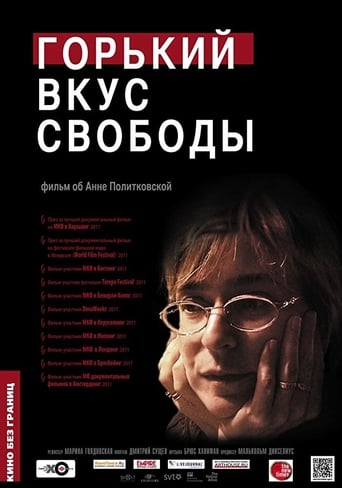lchadbou-326-26592
Russian documentary director Marina Goldovskaya was artist in residence in the spring of 2005 at Berkeley's Pacific Film Archive, when I saw her 1988 movie Solovki Power, that showed how labor camps for intellectuals,and the repression which took over the Bolshevik revolution, often credited to Stalin, actually began with Lenin.I recently had the opportunity to see her 2011 A Bitter Taste Of Freedom, about the journalist Anna (Anya) Politkovskaya.It opens with news footage of the journalist's murder in 2006, soon we hear the voice of Goldovskaya, who knew Anna as a student, and we see the director herself a bit later; there's some narration but the filmmaker does not obtrude much, rather allowing us to engage with Anna's personality as we follow her back and forth through the years. One of those we see with her is her former husband Sasha who was the host of a provocative Friday night TV show, Outlook, and we realize the threats they received.There are clips from a 1991 film Goldovskaya did, A Taste Of Freedom, which I haven't seen, in which she documented the end of Communism there. In 1994 Russia invaded Chechnya and Anna immersed herself in the war, especially the suffering of the refugees, for which she was criticized as being too emotional and feminine.What she was actually doing was investigative journalism, rare in recent Russian history, and we hear from one of her supporters, Gorbachev, whose idea of perestroika, greater transparency, is discussed. By 1999 Putin takes over. Two terrible hostage situations are shown, which are among the most disturbing scenes in the film. The first is the takeover of the Dubrovna theater in 2002, culminating in Putin's use of a mysterious poison gas on the terrorists. Here she was brought in to try and help. In 2004 we see the attack on the Beslan school, where this time she was prevented from going to negotiate by a sudden poisoning en route. During this time Anna's work is recognized by awards we see her receiving in New York and Los Angeles. Given that Goldovskaya's film was only shown in the US at one festival (Santa Fe) and then apparently had a brief week's run in the 2 major cities for Oscar qualification, Anna's comment we see her making in 2002, "I can't understand why Hollywood is not interested," speaks to why the story should be more widely known, especially as there has been renewed scrutiny of the new repression under Putin. Goldovsakaya's documentary work in general, based on the two movies I've seen, also seems worthy of further study.

